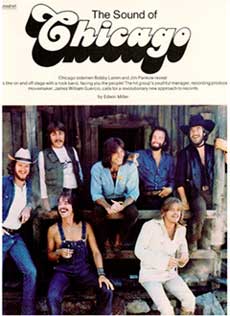
Chicago
Listen for free or download any Chicago track for just 12 cents per song!
The band Chicago has a long history, and unlike some bands that name themselves after a city they are not from, this band did form in their namesake in 1967. In the early days, Chicago was considered more of a rock band than the soft rock band they are known as today, and even somewhat experimental at times. Initially, Chicago called themselves The Big Thing, and they played cover tunes. Not long afterwards, they moved to Los Angeles, changed their name to Chicago Transit Authority, and signed with Columbia Records. They released their first self-titled album in 1969. After the real CTA complained about the band's name, they decided to shorten it, and their second album, Chicago was released in 1970.
Unlike many bands, Chicago did not require a ramp up from the early career to hit the charts. They had tons of hits in the 1970's, releasing at least one album per year throughout the 1970's. 70's songs you may remember include "Make Me Smile", "Colour My World", "25 or 6 to 4", "Saturday in the Park", "Dialogue (Part I & II)", ''Harry Truman", "Old Days", "If You Leave Me Now", "Alive Again", and "Baby What a Big Surprise". In 1978, Terry Kath, the prominent guitarist for Chicago, died in an accidental shooting. Henceforth, the music of Chicago moved away from a jazz rock sound to a more pop rock sound.
As the 1980's rolled in and on, so did Chicago. Their 1980 release, Chicago XIV, did not do exceptionally well, and Columbia subsequently dropped them (oops). Warner Brothers took up the slack, and many 80's hits followed. "Hard to Say I'm Sorry/Get Away" was a hit from Chicago 16, and the group's biggest selling album to date, Chicago 17 (1984), featured the following hit songs: "You're the Inspiration", "Hard Habit to Break", "Stay the Night", "Along Comes a Woman". It was around this time that Peter Cetera's brother, Kenny, joined the band, and MTV became a way for the band to expand their fan base.
By 1985, Peter Cetera had decided to release some solo albums, and he met with some success with the songs "Glory of Love", "The Next Time I Fall", "One Good Woman", and a duet with Cher called "After All". Chicago continued on with a new singer, and Chicago 18 produced the hit songs "Will You Still Love Me" and "If She Would Have Been Faithful". Chicago 19 (1988), featured the hit songs "Look Away" and "What Kind of Man Would I Be?". "You're Not Alone" was a hit song released on the band's 1989 greatest hits release.
As the years have rolled on, Chicago has continued producing new material, including some great box sets. They could also be found on stage from time to time. At the time of this writing, the Chicago Discography was as follows:
Listen for free or download any Chicago track for just 12 cents per song!
- 1969: The Chicago Transit Authority
- 1970: Chicago
- 1971: Chicago III
- 1971: Chicago at Carnegie Hall
- 1972: Chicago V
- 1973: Chicago VI
- 1974: Chicago VII
- 1975: Chicago VIII
- 1975: Chicago IX
- 1977: Chicago X
- 1977: Chicago XI
- 1978: Hot Streets
- 1979: Chicago 13
- 1980: Chicago 14
- 1981: Greatest Hits Volume II
- 1982: Chicago 16
- 1984: Chicago 17
- 1986: Chicago 18
- 1988: Chicago 19
- 1989: Greatest Hits 1982-1989
- 1991: Twenty 1
- 1995: Night & Day Big Band
- 1997: The Heart of Chicago 1967-1997
- 1998: The Heart of Chicago 1967-1998 Volume II
- 1998: Chicago XXV: The Christmas Album
- 1999: Chicago XXVI: Live in Concert
- 2002: The Very Best of: Only the Beginning
- 2003: The Box
- 2005: Love Songs
- 2006: Chicago XXX
- 2007: The Best of Chicago: 40th Anniversary Edition
- 2008: Chicago XXXII: Stone of Sisyphus
- 2011: Chicago XXXIII: O Christmas Three
- 2011: Chicago XXXIV: Live in '75











